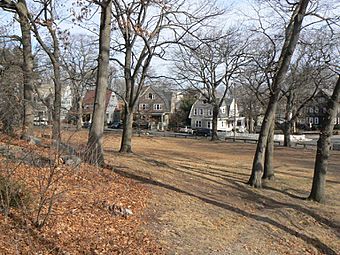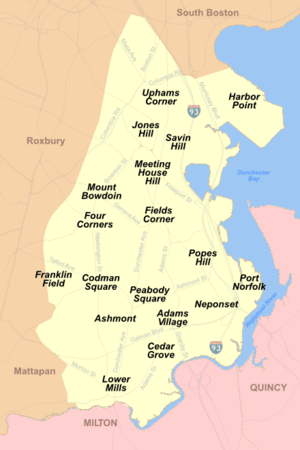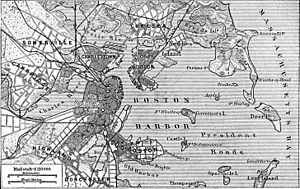Savin Hill facts for kids
Quick facts for kids |
|
|
Savin Hill Historic District
|
|

A view into the neighborhood from the park encompassing the top of Savin Hill
|
|
| Location | Boston, Massachusetts |
|---|---|
| Architect | multiple |
| Architectural style | Greek Revival, Gothic Revival |
| NRHP reference No. | 03000385 |
| Added to NRHP | May 9, 2003 |
Savin Hill is a cool part of Dorchester, which is the biggest neighborhood in Boston, Massachusetts, United States.
This area is named after a hill it covers. Savin Hill is about one square mile in size. Around 15,000 people live here. Savin Hill Beach and Malibu Beach are close by. They are great places for people from the area to visit. You can get to Savin Hill easily by train or bus. The Savin Hill station is a main stop.
It is also home to the Savin Hill Yacht Club. This club started in 1875 as the Savin Hill Beach Association. It changed its name in 1888. The club is located near Morrissey Boulevard, a big road in the area.
Contents
History of Savin Hill
Early Beginnings
For hundreds of years, the Neponset Indians lived in Savin Hill. They were part of the larger Massachusett tribe. They spent their summers here. Captain John Smith, an early English explorer, visited Dorchester in 1614. He traded with the Neponset Indians.
Savin Hill was settled in June 1630. This was just a few months before Boston was founded.
The first non-native people to arrive were Puritans. They came from England on a ship called the "Mary and John." They first settled further south, near Hull. Later, they moved north to a hill overlooking a safe harbor. This harbor is now called Dorchester Bay.
They landed in boats and built a settlement for about 140 people. This was near where Grampian Way and Savin Hill Avenue meet today. At first, this area was called Rock Hill.
By the 1780s, the name changed to Old Hill. This was when the United States was a very new country.
The 1800s and Growth
Dorchester used to be a very large town. Its border reached almost to Rhode Island. Over time, smaller towns broke away from Dorchester. The town's size kept shrinking. In 1870, Dorchester officially became part of Boston. The name then became a neighborhood name. By this time, the rocky hill where the Puritans first settled had a new name: Savin Hill.
Joseph Tuttle, who ran a local inn, gave the area its new name. He opened a fancy hotel in 1819. It was at the corner of Savin Hill Avenue and Tuttle Street. He named the area "Savin Hill" because of the many red juniper trees (Savin trees) that grew there.
After the American Civil War, the Worthington family owned most of the land. They started selling plots of land for houses. Many of the beautiful Victorian homes you see on the hill were built then.
Transportation helped the neighborhood grow. The Shawmut Branch Railroad connected Savin Hill to downtown Boston in 1872. The Old Colony Railroad soon bought it.
The 1900s and Changes
The Savin Hill Station became part of Boston's train system in 1927. It is now part of the MBTA Red Line.
In the early 1930s, Morrissey Boulevard was built. This road separated Savin Hill from the ocean. This made Savin Hill a very clear area within Dorchester. The Southeast Expressway (Interstate 93) was built in the late 1950s. This highway made the hill stand out even more. Today, the original part of Savin Hill is often called "over the bridge." This means it's on the east side of where Savin Hill Avenue crosses the Expressway. The full Savin Hill area now goes as far west as Pleasant Street. It runs from Columbia Road to Hancock Street.
Savin Hill is a bit separate from other areas. It has strong, old, and important houses. It is also close to downtown Boston. These things have made Savin Hill very popular. Many of its traditional two- and three-family houses have been turned into condos since the late 1990s.
Savin Hill Today
Because of its unique history, the whole neighborhood was added to the National Register of Historic Places in 2003. This means it is recognized as an important historic area.
 | Selma Burke |
 | Pauline Powell Burns |
 | Frederick J. Brown |
 | Robert Blackburn |





